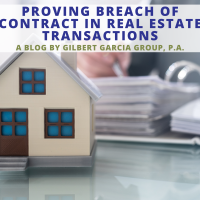Proving Breach of Contract in Florida Real Estate Transactions

So, you’re facing an unfortunate real estate contract dispute, have determined the opposing contract party has not met their agreed upon obligations, and are now considering moving forward with formal legal dispute resolution methods. We previously discussed the basics of disputing a purchase agreement real estate contract and understanding breach of contract in Florida. There, we mentioned that when one party fails to fulfill their contractual obligations and informal negotiations fail or are not feasible, it may be necessary to partner with an experienced real estate attorney to file a lawsuit in court. A critical piece of the dispute resolution process is ensuring the breach can be proven in Florida courts. In this blog we’ll dive deeper into exploring the key elements of proving a breach of real estate contract, as well as provide examples to help you understand how this situation could apply to your own real estate endeavors.
There is no question that, to prove breach of contract, you must establish the existence of a valid and enforceable contract. A valid contract requires an offer, acceptance, consideration, competent parties, and a lawful purpose. Additionally, the terms and conditions of the contract must be clear, unambiguous, and legally binding.
Example: Suppose you are a buyer in a real estate transaction and have a signed purchase agreement that outlines the purchase price, closing date, a description of the property, and other essential terms and elements. The existence of this is likely a valid and enforceable contract that provides a foundation for proving breach of contract.
With the valid contract in hand, next, one must demonstrate that the breaching party failed to perform their contractual performance obligations as agreed upon. This can involve a wide range of non-performance scenarios, such as failure to deliver the property, failure to make required repairs, or failure to meet specific deadlines.
Example: Imagine you are a seller who completes all the necessary repairs on the property before the agreed-upon closing date, but the buyer fails to fulfill their obligation to provide the necessary funds. The buyer’s failure to perform their payment obligation constitutes a breach of contract. So, what are the remedies for a seller in a buyer’s breach of contract? It is generally assumed that the seller keeps the buyer’s earnest money deposit if they fail to meet their end of the agreement, however, these terms must be written into the signed sales contract. In certain cases, if the buyer has a valid reason for non-payment and/or backing out of the deal, the buyer could get their money back. Since both parties often believe they are both entitled to the earnest money deposit, the matter must be taken to court for breach of contract litigation.
In Florida, a material breach refers to a substantial failure to perform a contractual obligation. In other words, if one party’s failure to perform the contract’s essential terms substantially affects the other party’s rights and expectations, a material breach has occurred. To prove a material breach, you must show that the non-performance significantly impairs the value or purpose of the contract, resulting in harm to the innocent party.
Example: Suppose you are a tenant leasing commercial space, and the landlord fails to provide necessary utilities for an extended period, rendering the space unusable for your business. The lack of utilities in this case would likely be considered a material breach of the lease agreement.
To support your claim for damages resulting from the breach of contract, you must demonstrate that you took reasonable steps to mitigate your losses. This means actively seeking alternative solutions or minimizing the damages suffered. Failure to mitigate damages may limit the amount of compensation you can recover.
Proving breach of contract in Florida real estate transactions requires a careful analysis of the contract and potential actions taken. When someone breaches a contract in Florida, the other party typically has several legal remedies, but having evidence to support the claim is critical. When facing or considering suit for breach of a real estate contract, consulting a knowledgeable, experienced real estate attorney is essential to protecting your interests. Let the Tampa real estate experts at Gilbert Garcia Group assess your specific situation and provide tailored legal guidance and effective advocacy. Contact Gilbert Garcia Group today.
